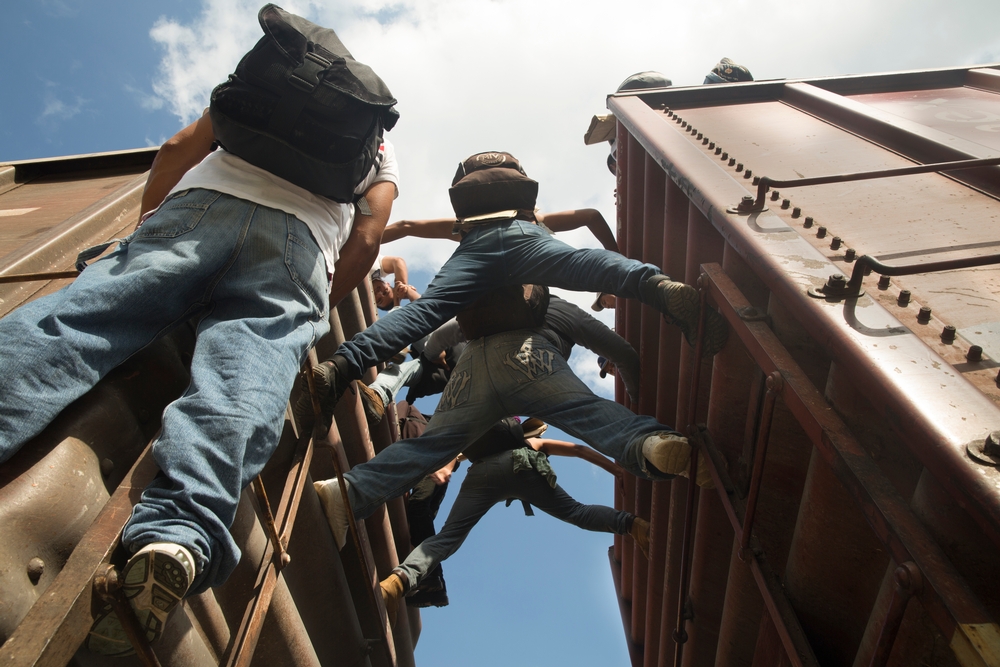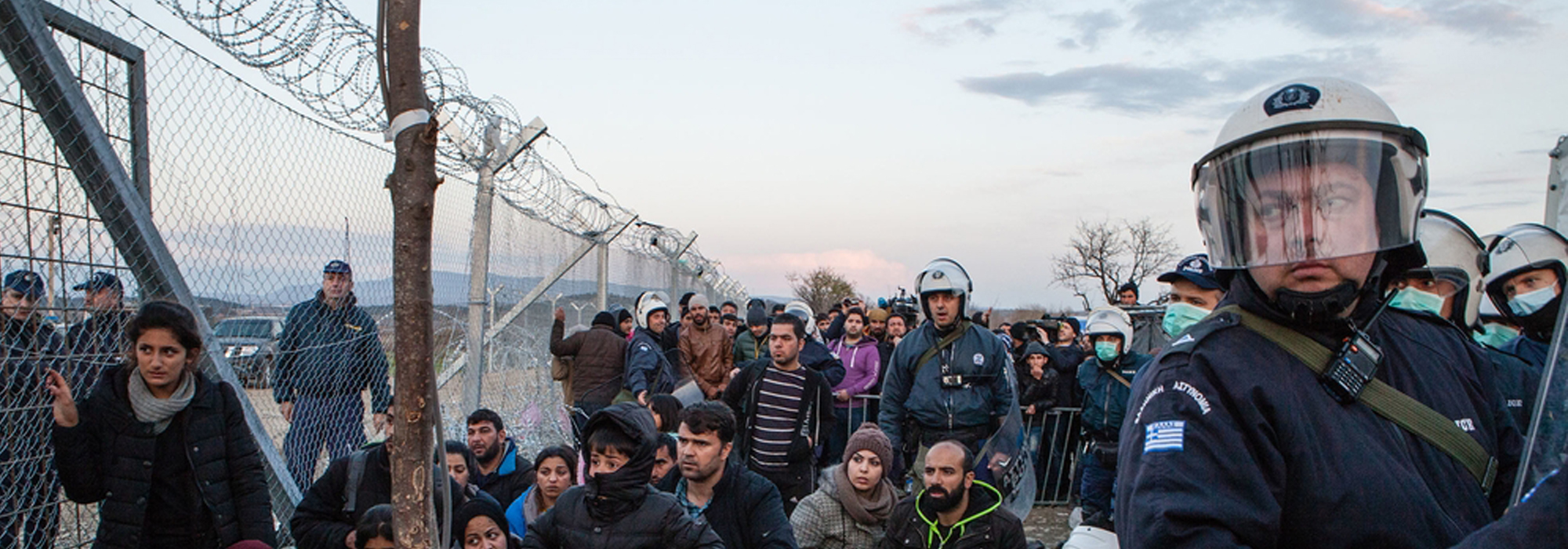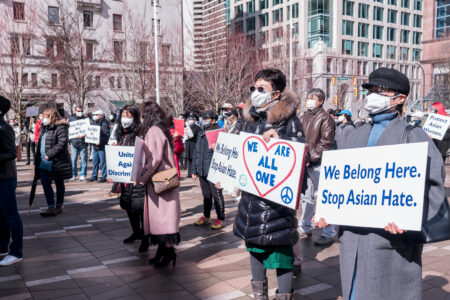
Some 60 million people are in flight worldwide, many of forcibly displaced from their homes. These people represent the greatest mass migration since the Second World War. The majority of those fleeing are trapped inside conflict zones, stuck in under-served camps or corralled into transit or detention centres. The act of migration itself is increasingly restricted and results in greater suffering, insecurity and vulnerability for those in flight. With diminishing legal routes for asylum seekers and our collective welcome mat rolled up and tucked out of sight, a growing number of undocumented migrants, refugees and asylum seekers remain underground and unprotected, because of hardening national legislation, regional deterrence policies and the erection of new physical barriers.
These barriers are constructed to prevent people from safely reaching territory where they can seek asylum and claim international protection. Rather than stemming the flow of migrants, these punitive practices push them underground into illegality and force them to attempt routes that are ever more dangerous. As a result, they are even more vulnerable and their physical and mental health is negatively affected.
Today, the policies of many destination countries aim to deter irregular migration by using out-of-sight — and at times nefarious — detention and interdiction practices that can prevent people from legally escaping situations of violence and hardship in their home countries, hindering their human right to flight and access to health care.
Since its founding in 1971, the independent humanitarian medical organization Doctors Without Borders/Médecins Sans Frontières (MSF) has provided care to refugees and those caught in conflict around the world. In countries such as Somalia, Syria, Afghanistan and South Sudan, MSF assists people who have been obliged by conflict, disaster or persecution to leave their homes. Field workers witness the dangerous situations people are forced into by displacement and restrictive policies, such as perilous journeys across the Mediterranean Sea. In 2015 the organization launched its first-ever sea rescue operations to save the lives of people drowning while attempting to reach Europe by sea. It responded to the crisis in Europe caused by the collective failure of European countries, and called on countries to address refugees’ humanitarian needs and provide search-and-rescue, safe and legal passage, and adequate reception. By May 31, 2016, 2,856 migrants had already paid with their lives for the chance of finding safety and a better life.
MSF delivers emergency medical care based on patients’ needs, without regard for their status, ethnicity, religion, gender or identity. Many of our patients have fled or lost their homes and are in an extremely vulnerable state; some suffer from health and psychological conditions as a direct result of the dangers caused by their migration journeys and by the policies that exacerbate those hardships— including some pursued by Canada and other countries. The rationale used for the implementation of these policies falls under the umbrella of “securitization,” prioritizing border control over the plight of people seeking protection.
The fundamental humanitarian needs of people travelling in search of safety, freedom or better lives should not be denied to them by short-sighted and poorly aligned migration policies that fail to address the immensity of a global crisis in which tens of millions have been driven from their homes. The negative health and psychological consequences of such policies and approaches have already exacerbated the suffering experienced by millions of people in flight — something that should be unacceptable. Governments must respect their obligations under international humanitarian, refugee and asylum law, and as global citizens, to protect the world’s most vulnerable from harm. They must address the incoherent and ineffective policies causing so much suffering and create a more equitable and humane response within the multilateral system.
Dangerous journeys, exclusion from health care
For many, forcible displacement is linked to chronic factors such as extreme economic deprivation, seasonal food insecurity and persistent religious or ethnic persecution. Increasingly, however, the most significant factor causing displacement is acute violence, whether in war zones such as Syria, or in regions like Central America, where criminal gangs can act with terrifying impunity. For example, 42 percent of migrants from El Salvador treated by MSF teams along the migration corridor through Mexico said the primary reason for their journey was to escape criminal violence at home.
And yet migration journeys themselves are risky and violent. In Mexico, women and men routinely report intimidation as well as physical and sexual violence by smugglers, criminal groups and security forces along migration routes and in detention centres. Migrants who have been brutalized or injured are further harmed by their inability to access health care, because of their lack of legal status and fear of authorities. Even when assistance is offered through religious charities or clinics run by NGOs, smugglers often block access to these services. In 2014, 4 out of 10 patients seeking care in the MSF clinic in Ixtepec, Mexico, reported significant mental health issues. Eighty percent had witnessed violence, and 10 percent had suffered violence first hand.
People report similar experiences in other parts of the world. Agnes, an Eritrean woman rescued by MSF’s search-and-rescue operations from a sinking migrant boat in the Mediterranean Sea in 2015, described some of the abuse she and her fellow travellers were subject to on the underground migration networks that were the only choice for them: “We travelled in containers, like animals or objects,” she said. “It was very dark and hot in the containers. Many people fainted because of the heat and some died…It was very difficult for my daughter — she fell sick many times. There was a lot of violence. I was beaten with bare hands, with sticks, with guns. If you move, they beat you. If you talk, they beat you. We spent two months like that, being beaten every day.”
“I knew that the journey would be very dangerous and difficult,” she said, “especially for my daughter. But what was the alternative? We could not survive in Eritrea or Sudan. Our government does not allow people to leave. With our documents in Eritrea, there was no other way for us to get to Europe.”
Agnes’ story highlights not only the brutal violence that many migrants are subjected to while trying to reach their intended destinations, but also the dilemma they face: should they risk the horrors of the criminal-run migration routes or remain trapped in untenable situations at home? This choice is the direct result of policies that place deliberate obstacles in the paths of those who wish to seek refuge or asylum in new countries. By making it nearly impossible for migrants to travel legally to their destinations, governments force them into underground networks run by violent criminal gangs, in effect giving them — already vulnerable to abuse and hardship in their home countries — no choice but to risk potentially worse violence at the hands of smugglers and other predators in order to escape.
This de facto criminalization of migration is the result of specific practices and policies pursued by many destination countries, such as screenings in European airports and the United States’ hard-fisted attempts to block migrants from physically accessing its southern border with Mexico. By making it more difficult for people to cross borders by legal means, these measures increase the humanitarian consequences of the global displacement crisis, by giving rise to robust and mercenary criminal networks that seeks to profit from violent control of underground migration routes.

Interdiction and detention
An increasing number of destination country governments are engaging in extraterritorial interdiction measures in an attempt to prevent migrants and asylum seekers from ever leaving their homes or transit countries. These intergovernmental cooperation agreements were security and bureaucratic undertakings and exchanges and now include financial payments, which push screening offshore, install virtual borders and prevent migrants from exercising their rights to seek protection and declare asylum.
These efforts produce the situations that make legal travel virtually impossible, forcing migrants into the hands of underground criminal networks. Furthermore, Australia, Denmark, Germany, the Netherlands, the UK, the United States and Canada employ special migration integrity officers to advise other governments. They effectively shift the responsibility for screening onto airlines at foreign airports by advising them on how to detect fraudulent travel documents to keep away “unwanted” migrants. Such advanced screening often prevents those fleeing persecution and violence from being able to seek and exercise their right to asylum.
Interdiction measures often require partnership with governments in origin and transit countries, many of them well known to have weak human rights records. These measures increase migrants’ vulnerability to arrest, detention, persecution and harm, by returning them to their country of origin, which they fled to seek safety, or by not letting them leave transit countries and bringing them to the attention of authorities.
The March 2016 EU-Turkey deal that enforces migration cooperation between EU member states and Turkey is causing unacceptable human consequences and violates the moral and legal responsibility to assist women, men and children who are asking for protection. MSF condemns the deal as a false solution and an affront to humanitarian obligations.
While the protection of borders and access to territory falls within states’ rights and responsibilities, the interdiction approach removes refugees’ rights to seek asylum and their ability to seek international protection. The “externalization of borders” is essentially an act of outsourcing: wealthy countries that do not want new migrants, but are required by international obligations and treaties to provide care and asylum for refugees, seek to bypass these responsibilities by paying other governments to do it for them.
Canada’s record as a destination country
As a signatory to the 1951 Refugee Convention, Canada has a legal obligation to assist refugees. It has made an effort to live up to these obligations, and in some respects has demonstrated an open approach in its treatment of migrants and refugees. For example, it recently showed leadership by welcoming Syrian refugees, and it reinstated supplemental health care for all refugees and asylum seekers.
But Canada also has an uneven record when it comes to asylum seekers and migrants trying to reach Canada. In 2012, the government introduced a “safe” designated country of origin (DCO) category for refugees, meaning asylum seekers from those places can be returned without concerns that they are at risk from persecution. This controversial list includes Mexico, which has been plagued by militarized drug wars and violence. The DCO list makes it difficult for refugee claimants who reach Canada to pursue their claims, as the timelines for their Refugee Protection Division hearings are shorter.
Canada continues to use detention as part of its migration-policy toolbox. In 2009 and 2010 the arrival of two boats of asylum seekers from Sri Lanka prompted the government to introduce legal changes — implemented in 2012 — to impose harsher anti-smuggling measures and create the category of “irregular arrivals,” who would be subjected to mandatory detention. Such detainees are usually held at immigration holding centres (IHC) operated by the Canada Border Services Agency or at provincial prisons. Criminal facilities are used for high-risk detainees when the IHCs are overcrowded and when there is no dedicated immigration facility for high-risk detainees in the region. In Canada, 30 percent of immigration detainees are held in provincial prisons, despite the fact they are a low-risk, noncriminal population.
Refugee experts are concerned about the well-being of people who may never have experienced a “prison-like environment before.” And experts who visit IHCs report that the harm caused by detention is not limited to the incarcerated population: there is a ripple effect, because it fosters negative impressions in the wider public of detainees as criminals and deviants. This can feed into a moral panic surrounding boat arrivals. Hardening public attitudes towards migrants can become a justification for mandatory detentions.
According to MSF´s experience supporting migrants, interdiction and detention policies have severe humanitarian consequences. People suffer abuse and ill-treatment, and prolonged and indefinite detention is harmful to physical and mental health. In some migrant reception centres, MSF has stopped work because of the inadequate, harmful or undignified care and reception that migrants receive. For example, it ceased work at the Moira “hotspot” for migrants in Lesbos, Greece, in March 2016, because of “unfair and inhumane” treatment.
While MSF does not work with migrants in Canada, it is concerned that the country is one of the few in the West that has no time limit on detentions. The UN Human Rights Committee is alarmed by accounts of indefinite detention of migrants and mandatory detention of people who enter Canada through “irregular” channels. They also have concerns about similar practices in Australia and the United States.
A shared responsibility
The global displacement crisis and responses to it is the defining issue of our time. We as an international community are failing our fellow human beings, and we are creating social, health, security and economic problems instead of solving them. History will judge us. The surge of displacement is sure to continue, and governments and citizens will have to figure out how to address this political challenge. It is an enormous task, and tackling it will take resources, collaboration and sustained commitment.
MSF urges all countries to uphold their moral and legal obligations to treat all people in a fair, humane and dignified manner. The organization has a humanitarian role to play in assisting people who are in need, but the solution to the migration crisis must be political.
There is an urgent need for a paradigm shift. We must approach this crisis as a shared global responsibility.
Photo: Médecins Sans Frontières / Doctors Without Borders (MSF) Canada
Do you have something to say about the article you just read? Be part of the Policy Options discussion, and send in your own submission. Here is a link on how to do it. | Souhaitez-vous réagir à cet article ? Joignez-vous aux débats d’Options politiques et soumettez-nous votre texte en suivant ces directives.







